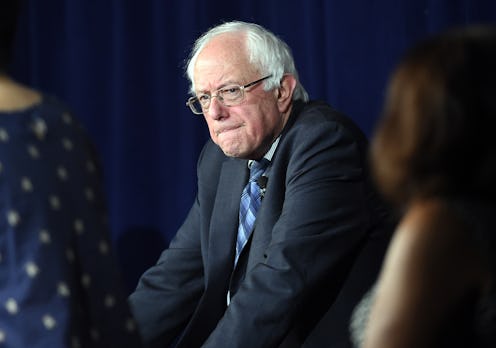News
What Bernie Needs To Do During The Next Debate
On Saturday, the remaining three Democratic presidential candidates will take to the stage in Des Moines, Iowa, for the second Democratic presidential debate, set to air on CBS News, and there will be a lot on the line. While the polls haven't significantly changed since the last time the candidates squared off — it's still Hillary Clinton out front, Bernie Sanders next, and the distantly trailing Martin O'Malley bringing up the rear — Sanders, in particular, faces a crucial moment. So, what does Bernie Sanders need to change before the next debate if he wants to bring this one home?
The last time Sanders spoke to a nationally televised audience about his campaign and his beliefs was during last week's Democratic Candidates Forum, hosted by MSNBC's Rachel Maddow. Before that, he faced off against Clinton and O'Malley, as well as now-departed challengers Jim Webb and Lincoln Chafee, at the first Democratic debate in Las Vegas. Both times, he leaned hard into his core message of economic justice, tackling things like income inequality, under-regulated and bloated big banks, national health care, and the minimum wage, and the passion was evident each and every moment. It's undoubtedly the single policy area that gets him the most fired up, and with which he's most rhetorically gifted.
However, this great strength is also part of his deepest, most fundamental weakness: The message is consistent, but it's too damn repetitive, and it's choking off his campaign's full potential.
There's no denying that Sanders is an exciting candidate for a certain kind of progressive — someone who views economic justice and corporate greed as defining issues of our time, and doesn't believe that true change can actually result from electing an establishment figure like Clinton. There's nothing wrong with wanting to put someone of Sanders' clear, unapologetic vision in office, even if he fails to give the same amount of attention to every issue that he does his signature one.
That said, Sanders faces a huge challenge. He's already lost his short-lived lead in the polls in New Hampshire, he trails in Iowa, he's getting crushed in Florida, and South Carolina isn't looking much better. And it's getting increasingly hard to conceive of how he could win one of these debates in a way that would meaningfully change that picture, because his economic justice message already thoroughly saturates his campaign, and his numbers have stalled out anyways.
That's why Sanders ought to try a bold strategy on Saturday, one which would probably shock the political world, and which Clinton couldn't possibly expect — if Bernie Sanders wants to win the debate and shake up the race, he should actually step away from his economic justice message on Saturday night.
Not abandon it, to be clear. But even if only for one debate, just to see if it has an impact, Sanders should try to go a whole debate without relying so heavily on his economic justice platform. Instead, he should take every opportunity to pivot away from economics, and expand on other domestic or international issues: environmentalism, immigration, racism, reproductive rights, transgender rights, the Department of Veterans Affairs, the Middle East, Russia, NASA funding, anything!
It's not so much about the positions themselves, as it is proving that he can be a president in all the different ways he'll need to. Proving that he can place other constituents' chiefest issues right up there among his own, and speak about them with the same authority, expansiveness, and passion he shows when he's in his economic justice element. Sanders is pro-choice, for example, just like you'd expect, but for any progressive voters on the front lines on the reproductive rights battle, it's important for him to prove it's a real priority. Not just that he can talk about it, but that he wants to.
While it's genuinely hard to imagine what a game-changing debate would look like, this could be a start. Rather than simply rehashing what people already know about Sanders — which clearly hasn't propelled him over the top on its own — it could show America a side of him it hasn't seen before, and directly demonstrate that he's got a fuller, more robust grasp of issues near and dear to progressives than he always shows. Not only would that be a meaningful victory for Sanders, it could actually turn him into the kind of candidate Clinton would have to seriously sweat.
One thing's for certain: If he does have plans to diversify his rhetorical playbook, he ought to do it soon, and in a big way. There will only be four more Democratic debates after Saturday's, a fact that Sanders' campaign has been vocally unhappy about, but if he makes the best use of the time he's got left, even that limited schedule could be enough to help his fortunes.
